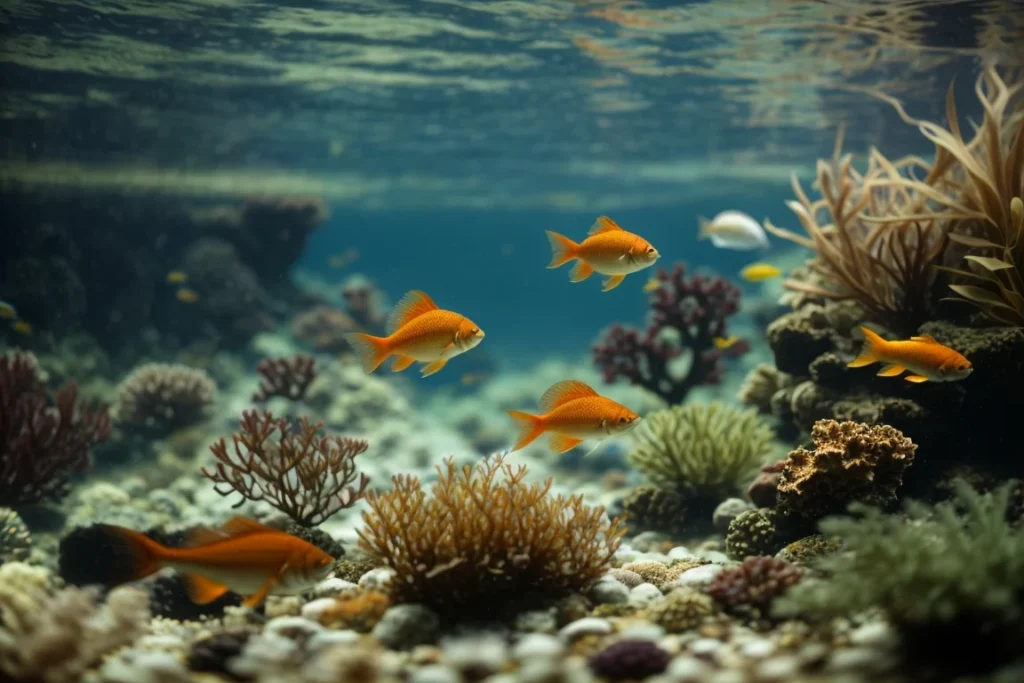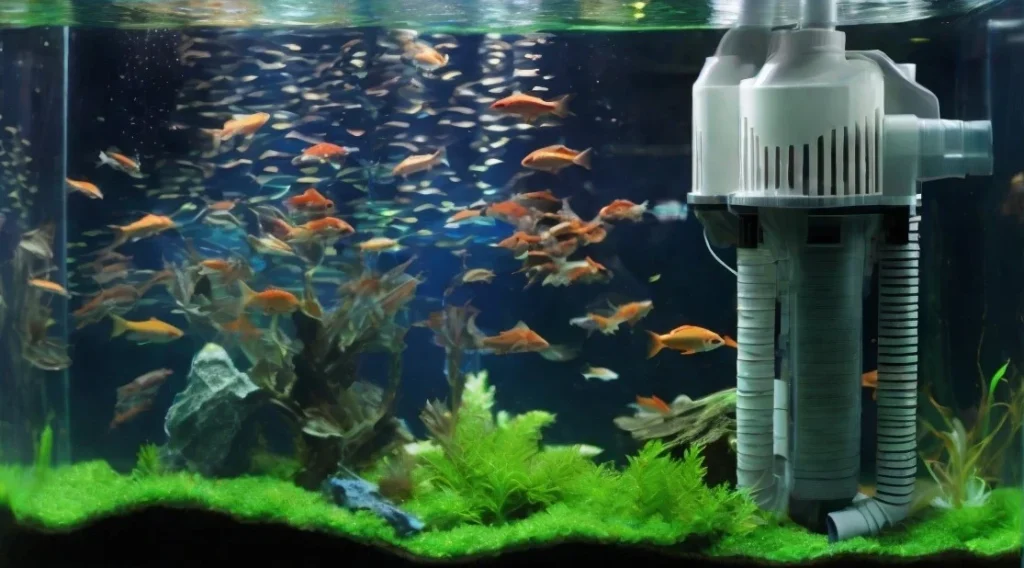Having an aquarium filter is crucial for keeping fish healthy and happy. But what happens if the filter stops working? Can fish survive without a filter, and for how long? This article dives into the details of how long fish can live without a filter under different conditions.

An Overview of Aquarium Filtration
Before getting into fish survival times without a filter, it helps to understand what aquarium filters do in the first place. Aquarium filters serve two primary purposes:
- Cleaning the water – Fish waste, uneaten food, and other debris accumulate over time. The filter helps remove solid particles through mechanical filtration and hosting beneficial bacteria that break down toxic compounds like ammonia and nitrite through biological filtration.
- Oxygenating the water – Most filters continually circulate and aerate the tank water. This oxygenation is vital for fish to breathe.
So in essence, a filter keeps the water clean and oxygenated. Without one, ammonia and nitrite can accumulate to toxic levels, oxygen can deplete, and the overall water quality degrades. This is why filters are so critical in aquariums.

The Basics: How Long Can Fish Survive Without a Filter?
As a general guideline, most fish can survive between 3 and 7 days without a filter, assuming the rest of their environment remains stable. However, many variables affect this time frame.
Some key factors include:
- Type of fish – Some species are more sensitive than others. Small tropical fish tend to have lower tolerance than hardy fish like goldfish.
- Stocking density – Heavily stocked tanks deplete oxygen and accumulate waste quicker.
- Water changes – Partial changes can extend survival by replenishing oxygen and diluting waste.
- Supplemental aeration – Adding air stones or agitating the surface can help oxygenate the water in a filter’s absence.
- Water temperature – Warmer temperatures lower oxygen saturation. Cooler water can buy extra time.
- Tank size – Waste accumulates faster in smaller volumes of water.
So while 3-7 days is a fair starting point, certain scenarios may shorten or lengthen this timeframe. Do not take fish for granted and assume they can last a week without a filter in all cases. Monitor water parameters closely without one.
Factors That Affect Fish Survival Time Without a Filter
Many variables play into how long fish can live filter-free. The fish species and the water quality are two of the biggest factors.
Fish Species
Some types of fish are naturally more resilient than others regarding water conditions.
Coldwater species like goldfish and koi carp tend to tolerate stagnant, low-oxygen water better than tropical fish. They can often survive over a week without a filter if the water stays cool. Fancy goldfish are an exception, as they are prone to swim bladder issues without water circulation.
Betta fish can also persist in bowls without filters for longer than a week, absorbing oxygen from surface air. However, they thrive much better with filtered, heated tanks.
African cichlids are sensitive to water changes and can deteriorate rapidly without a filter. Many keepers report losing cichlids after just 2-3 days without filtration.
Saltwater fish are even more vulnerable, as ocean environments are more stable. Reef species like clownfish may succumb within a day without water movement and filtration. Avoid filter failures at all costs with marine fish.
Small tropical freshwater fish like tetras, guppies, and rasboras also have low tolerance. While larger fish like angelfish and oscars may last 5-7 days, small species die after just 2-4 days without a filter. Their bioload impacts water quality faster too in small volumes of water.
So know your fish species when estimating survival time sans filter. Sturdy goldfish and bettas have a buffer, but scaleless tropical fish live on borrowed time without filtration.
Water Quality
Water conditions are the other major determinant of fish survival without a filter.
As the filter cleans the tank and processes waste, toxic ammonia and nitrite levels start creeping upward almost immediately without it. These compounds burn fish gills and poison their systems. Even small amounts of ammonia over 0.25 ppm can be lethal.
Oxygen levels also begin falling immediately without water circulation and surface agitation from the filter. Oxygen is critical for fish to breathe and thrive.
The more rapidly waste accumulates and oxygen depletes, the faster fish are likely to perish without a filter. Performing partial water changes can buy extra time by replenishing oxygen and diluting waste buildup. But there is no full substitute for filtration and water movement.
Use test kits to closely monitor ammonia, nitrite, and oxygen levels when going filter-free. This gives a better gauge of actual fish survival time than a generic estimate. Respond immediately if toxicity rises or oxygen crashes.
The Role of a Filter in a Fish Tank
To understand why filters are non-negotiable for healthy fish, it helps to examine precisely what aquarium filters do:
- Mechanical filtration – Filter media like foam or filter floss catch solid debris like fish waste, uneaten food particles, dust, and other organic matter. This removes cloudiness and keeps water clear.
- Biological filtration – Beneficial nitrifying bacteria colonize on filter media and break down toxic ammonia and nitrite, converting it into less harmful compounds.
- Chemical filtration – Activated carbon and other media help absorb discoloration, odors, medications, and some heavy metals.
- Circulation – Impeller motors circulate water around the tank for even distribution of heat, nutrients, and oxygen.
- Oxygenation – Surface agitation and ripples from filter outflow aerate the water with atmospheric oxygen.
- Polishing – Fine filter pads catch microparticles for crystal clear water.
Without this filtration and circulation, aquarium conditions deteriorate rapidly. Fish health and longevity are dramatically lower in unfiltered settings.
While air stones and water changes can provide temporary aid, there is no full substitute for a properly sized, high-quality aquarium filter. Invest in quiet, energy-efficient models and avoid situations without filtration.
Coping With Power Outages
One common scenario where aquariums are left without filtration is during power outages. How long can fish survive if the filter shuts off due to an outage?
The same 3-7 day guideline applies in these situations. But there are steps you can take to extend this timeframe:
- Leave the tank covered to slow oxygen loss.
- Add battery-powered air stones or air pumps to add oxygen.
- Change 10-25% of the water 1-2 times daily to replenish oxygen.
- Use water stored in oxygenated barrels, not straight from the tap.
- Reduce feeding to prevent waste buildup.
- Wrap filters in blankets to keep bacteria alive if weather is cold.
- Add bottled bacteria supplements to help control ammonia.
- Test water chemistry daily and perform water changes if ammonia or nitrites spike.
The key is limiting oxygen loss and waste accumulation. With diligent effort, well-acclimated fish can endure short-term outages of 2-5 days in a healthy tank. But seek generator power or alternate accommodations for extended multi-week outages to maintain filtration. Avoid power interruptions when possible.
Keeping Fish Alive Without a Filter Long-Term
The above emergency actions can sustain fish without a filter for days for short disruptions. But what about long-term? Are there any alternatives for maintaining aquariums indefinitely without conventional filtration?
The options are limited, but there are a few approaches:
- Understock tanks heavily – Very light stocking and oversized tanks allow waste dilution.
- Use dense plant growth – Aquatic plants act as natural filters, absorbing nutrients.
- Do frequent, large water changes – Exchanging 50%+ water manually controls waste.
- Supplement with air stones – Vigorous aeration provides oxygenation.
- Use an air-powered sponge filter – These provide mild aeration and biofiltration.
- Culture nitrogen-fixing bacteria – Bacteria supplements help control waste.
- Keep cold water species only – Goldfish and koi tolerate stagnant conditions best.
Even with these tweaks, unfiltered tanks require expert maintenance. Water parameters must be tested frequently to watch for signs of deterioration. While filters aren’t mandatory for fish survival, they make the hobby much more sustainable long-term.
Fish Species That Tolerate Unfiltered Tanks
Not all fish thrive equally without a filter. Some species are better adapted to low-oxygen, stagnant conditions in unfiltered aquariums and ponds. Fish that can persist weeks or months filter-free include:
- Goldfish – They can survive over a month with supplemental aeration. Fancy varieties may struggle though.
- Koi – These pond fish are very tolerant of poor water quality.
- Paradise Fish – A labyrinth fish capable of breathing air.
- Bettas – With surface access, bettas can breathe oxygen from the air.
- Guppies – Hardy and accustomed to stressful conditions. Limit numbers.
- White Cloud Mountain Minnows – Cold water makes them resilient.
- Zebra Danios – Tough generalists that adapt well to stagnant tanks.
- Crayfish – Not a fish, but do well without strong filtration.
- African Clawed Frogs – Amphibians that come to the surface for air.
- Snails – Help clean algae and debris in unfiltered aquariums.
While these species are more durable, they benefit greatly from routine water changes and aeration. Avoid unfiltered tanks, especially long-term, whenever possible. But some fish are better candidates than others if you have no alternatives.
Keeping Fish in Bowl vs Tank Without a Filter
Small bowls unfortunately remain common first homes for betta fish, goldfish, and other species. But bowls pose even greater challenges for fish health than unfiltered tanks.
In a bowl, water quality deteriorates rapidly from fish waste and limited dilution. Oxygen also depletes quickly with minimal surface area for gas exchange. The small volume of water leaves no margin for error.
A larger tank dilutes waste better and provides more surface area for air exchange. While neither setup is ideal without a filter, tanks give a buffer thanks to greater water volume. If the filter fails, fish survive longer in a tank rather than cramped bowl.
For comparison:
- Bettas – May survive 2 weeks in a 1 gal bowl vs. 4+ weeks in a 5 gal tank without a filter.
- Goldfish – Can last 2-3 days in a bowl vs. 5-7 days in a 10+ gallon tank filter-free.
Bigger is always better. But when housing fish without a filter is unavoidable, choose the largest tank or pond possible. This maximizes waste dilution and oxygenation to extend survival time. Avoid tiny bowls at all costs.
Short-Term Survival Without a Filter
Filters normally run continuously to preserve stable aquarium conditions. But what if you need to turn the filter off temporarily for tank maintenance or moving fish? How long can they survive in the short-term?
Here are some general guidelines:
- A few hours – Turning filters off for short cleaning or rescaping is generally safe. Limit to under two hours.
- Overnight (8-12 hours) – Most mature tanks can go overnight without a filter if well aerated.
- 24-48 hours – Healthy fish can go 1-2 days with air stones and water changes.
- 3-5 days – Only some hardy species survive this long in a cycled tank.
Avoid leaving the filter off for multiple days whenever possible. The margin for error is slim beyond 48 hours in most aquariums. Use battery-powered air pumps and do partial water changes if turning off the filter. And turn it back on promptly once the maintenance is complete.
Conclusion
Aquarium filters provide vital cleaning and oxygenation that fish need to stay healthy long-term. While some species can persist days or weeks filter-free from their adaptable nature, all fish benefit greatly from proper filtration.
Target an uninterrupted filter uptime of 24/7. But if emergencies arise, most fish can survive approximately 3-7 days without a filter, with hardy species lasting longer. Supplemental aeration and water changes can buy extra time. Know your fish species’ needs and monitor water conditions closely when operating filter-free. Invest in reliable filtration and backup systems to avoid outages and maintain ideal aquatic conditions.